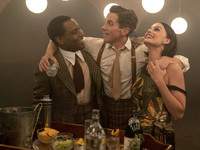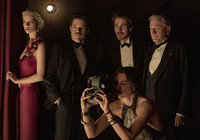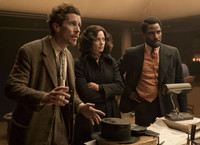How's your history? Do you remember a 1933 coup attempt in which a group of Wall Street fat cats plotted to overthrow President Franklin D. Roosevelt — a hateful socialist, in their view — and replace him with someone more to their liking? Someone along the lines of the up-and-coming Italian autocrat Benito Mussolini, or maybe that German fellow, Hitler? To do this, the fat cats — whose tentacles extended into entities like General Motors, General Foods and J.P. Morgan, and who called themselves the American Liberty League — planned to persuade an impeccably patriotic retired Marine Corps general named Smedley Butler to lead an army of jobless World War I veterans in a march on Washington that would topple the government.
You might not have heard of this, because it never happened. Maybe it almost did, or maybe it was a left- or right-wing political hallucination. Whatever the case, film director David O. Russell ("American Hustle," "Silver Linings Playbook"), a man of impeccably proggish views, saw in the story a strong cautionary link to last year's Trump-fueled Jan. 6 Capitol invasion. And now he's made a movie about it. Unfortunately, the movie is bad.
What went wrong with "Amsterdam"? Did Russell figure that stuffing the picture with a huge, top-tier cast (Christian Bale, Robert De Niro, Margot Robbie — Taylor Swift) would be sufficient to attract moviegoers hungry for big-budget prestige product? Word-of-mouth, which is likely to be brutal, may squash this notion like a fat, blood-swollen tick.
The movie's first problem crops up right in its trailer, which tells us, A LOT OF THIS ACTUALLY HAPPENED. In other words, a lot of it didn't — which is a bad start for a story that seeks to give us shivers of recognition about vintage political events (or almost-events). Then there's the plot, which some may find wildly incoherent (Russell wrote the script), and the pacing, which is chaotic (way too many characters jostling for attention).
The story begins in New York in 1933. There we meet Burt Berendsen (Bale), a WWI vet who lost an eye in France, and his best friend, Harold Woodman (John David Washington). Burt, who's a surgeon, and Harold, an attorney, met 15 years earlier (cue flashback) in a field hospital where they were tended by a beautiful nurse named Valerie Voze (Robbie), whom we find speaking French at first, but who soon turns out to be American (a needless bit of misdirection). When the war ends, all three of these characters relocate to Amsterdam, where Valerie and Harold become a romantic item and Valerie introduces Burt to an English replacement-eyeball manufacturer named Canterbury (Mike Myers) and his American associate Henry Norcross (Michael Shannon). As it soon turns out, these two are actually spies, Canterbury employed by MI6 and Norcross by U.S. military intelligence.
OK, let's take a break here. So far in the story, it's not at all clear what sort of movie we're watching. Is it a sweet romantic comedy, a spy thriller, a breezy Euro jaunt? The answer to each of those questions is no. What we have is a showcase for a large group of wonderful actors waiting in vain for the next train to comprehensible plotting to arrive. Bale passes the time delivering his lines in the manner of Peter Falk's old TV detective, Columbo. (He does this for no reason at all, although it is kind of amusing, in an unnecessary way.) Robbie demonstrates yet again her gift for sharp comedic line readings. And Washington, who's called upon mainly to be a staunch romantic lead, accomplishes that very well.
But let's move along. Back in New York, Burt and Harold hear about the death of their old regimental commander (Ed Begley Jr.), the man's fetching niece (Swift) having checked in with a suspicion that he didn't die of natural causes. (Swift's brief appearance occasions a jolt of comical action that could be the best thing in the movie.) Soon, a pair of dimwit detectives (Matthias Schoenaerts and Alessandro Nivola) are eyeing Burt and Harold as the killers. Not only that (this is a movie filled to bursting with not-only-thats), they're also being semi-menaced by a sinister couple played by Rami Malek and Anya Taylor-Joy, and before long are joined by Burt's bigoted wife (Andrea Riseborough). Eventually, they have the pleasure of encountering a celebrated war hero, Gen. Gil Dillenbeck (De Niro), who's being romanced by a cabal of wealthy right-wing Hitler groupies (he's the Smedley Butler figure).
I see I've left out Zoe Saldana, who brings a lovely glow to her affectionate scenes with Bale, and Chris Rock, who plays no clear role in the story but is always nice to have around anyway.
It is left to De Niro to wrap up the sprawling story with a stirring address to an arena full of desperate veterans, warning them about the damage being done to the country by the forces of wealth and privilege. It's always entertaining to hear a character as wealthy and privileged as this great actor step forward as a champion of the common man. (In a New York divorce proceeding two years ago, the plaintiff's lawyer asserted that De Niro, who has substantial restaurant and hotel holdings, was worth $500 million; his own lawyer, however, said he would be "lucky if he makes $7.5 million this year.")
The level of political sophistication on display in this movie is nicely summed up by its unlikely theme song, the 1971 hippie anthem "I'd Love to Change the World," by Ten Years After. It goes like this:
"Life is funny, skies are sunny
Bees make honey, who needs money?...
I'd love to change the world
But I don't know what to do
So, I'll leave it up to you"
Kurt Loder is the film critic for Reason Online. To find out more about Kurt Loder and read features by other Creators Syndicate writers and cartoonists, visit the Creators Syndicate website at www.creators.com.








View Comments